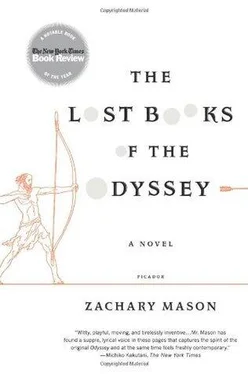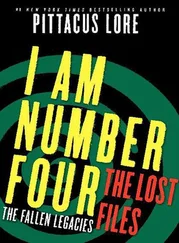In the fading light Hermes watched them go, exasperated. The sharp axe winked in the grass where he had put it weeks ago, the blade carefully turned to catch the evening sun. Behind it was a stand of straight, tall young pines, perfect for ship-building.
The war had been long and terrible. Of that Mr. O *was sure, though he could only remember a few disconnected, disconcerting images: Dust hanging over a battle-field, glowing as the sun rose behind it. A brass helmet struck into two pieces. A black tree in the middle of a white plain. Later he was told that these were images from famous songs, emblematic of the war — they had won prizes — and he had almost certainly not seen them firsthand. Nevertheless, he was sure he had been in the war. That was what the nurses told him, or at least implied, and then there were his scars, and why was he in this sanatorium if not to recover? Its small white cubical buildings clung to the island’s vertiginous cliffs like swallows’ nests, steep stairways tracing parabolic arcs between them. Cats sprawled on the walls tracking the sun and looking skeptically at the azure sea and the ospreys nesting in the parapets. Inexplicably, he wanted to leave. He exhorted himself to show a grateful spirit but this only made him more fretful. He took to plucking threads from his robe in the morning and to rolling bread pills at dinner. *
The days passed like a flock of white birds wheeling overhead and he remembered no more of himself though he frequently resolved to make it his business to do so. Sometimes he found notes he had written to himself that set out meticulous plans for recollection — meditation and a diary, for instance, both of which he had soon abandoned. There was a cedar chest full of keepsakes at the foot of his bed — a bag of salt, a ball of beeswax, a fire-sharpened olive-wood staff, a black-fletched arrow with a black shaft. He took to handling them in hopes of jarring loose a recollection.
During a musical evening a woman in a long green dress sang songs about an old war in which all-but-forgotten heroes fought and died for ends that even they, it seemed, held contemptible. Her plangent voice filled the music room, with its many rows of polite auditors and its ceiling painted like an evening sky. While others applauded, Mr. O reached absently into his coat pocket and found a worn, water-stained note, possibly in his own handwriting, advising him to take the cure with one or the other of the sanatorium’s eminent physicians.
He was rapidly granted appointments, with none of the usual sacrifices or purifications. First he went to Dr. Sylvia’s rooms in which wide panoramic windows opened over a long drop to the sea, where waves dashed against rock and swordfish were breaching. She spoke to him of the accumulations of moribund memory keeping him uncomfortably and pathologically anchored in the past, and how they could be expunged.
Next he saw Dr. Karidis, whose rooms were down many long flights of stairs, deep within the island, below the level of the sea. They were cool and dark, her silhouette barely visible, her bookshelves no more than conjectures in the shadows. She promised to usher him down and down, away from the moment, away from illness, through the watchful layers of ego, through the restive layer that always dreams and the torpid one that keeps the heart beating, till he need not come up again.
After the consultations he kept to his room for days, refusing to open the door no matter how the nurse knocked, but even without her patient, gentle remonstrances he knew he would have to choose one of them.
He chose Sylvia, explaining to the nurse on the way to the appointment his many and nuanced reasons for doing so, though really it was because she was slightly the less terrible of the two.
The appointment itself was a blank, as were the days that followed.
When he came back to himself he was disoriented and forgetful and explored his room as though it were new to him. There was little to find — a new diary, the pages uncut, and an empty cedar chest. He was going to give up and go back to bed but something moved within him and he kept searching, replying with feigned cheerfulness when a nurse called out from the hall to ask him how he did. His persistence was rewarded with the discovery of a small paper parcel wedged between the mattress and the headboard. Unfolding the paper, he found it bore a drawing of a horse, composed of just a few lines but executed in a confident, energetic hand. Within the paper was a plait of red hair. He held it to his face and inhaled, and a great longing swept over him to which he could not put a name.
One morning soon after, a nurse came to his room, with his draft, he thought, but instead she looked very grave and explained that things had changed. The war, which had been thought to have settled, had only been hesitating. It was racing southward now, scattering all before it, and they had to go. Where will you take me? Mr. O asked. And what about my condition? My consultations? An awkward pause. Resources were limited, the nurse explained, and the rigor of the times such that some, the infirm, the less useful, must be left behind.
To that he had nothing to say. He took to wandering among the white buildings, now empty. Sometimes there was a vague idea of another island, like this one but less lovely and more remote, but he could not put a name to it or remember the way.
*The text for this chapter omits Odysseus’s name, providing instead what is, most probably, the uninflected masculine honorific followed by the letter Omega. “Mr. O” is a reasonably close rendering.
*Around the first millennium B.C., the greatest centers of medical learning in the Greek world were the temples of Asclepius in the Cycladic archipelago. These temples were, in effect, hospitals. At the top of the temple hierarchy were the doctors, of whom each temple had only a few. They were believed to have the ear of the god and supernatural powers of healing. Access to them was carefully restricted — the sick might have to wait in the temple a year and slaughter a hecatomb of livestock before being granted an appointment. Whether this was due to the number of patients, demanding religious practices or a stage-craft of self-importance is not entirely evident from the textual and archaeological records.
The nursing at the temple was carried out by women serving two-year terms in the service of the god. Many women joined after their husbands died. Though they were not exactly nuns, they were celibate for the term of their service and lived an essentially monastic life.
Odysseus roamed wild through the low hills of Ithaca. He swam like an otter through the rough surf and riptides, and knew every cave, thicket, and droning, butterfly-haunted field. He hunted birds in the wood, lying in wait for hours till the silence seemed to fill him (but never a perfect silence — there was always something that was not quite a noise, right at the edge of hearing). The outer world was fog coming in over the ocean, a white sail on the horizon and the rumor of distant relatives. His parents tried to civilize him, and though he learned how to play the lyre and use a sword he saw these as mere formal observances, not touching his real self or the continuity of his days.
In a wood by the sea there was a crumbling Egyptian temple, *its surviving columns carved with men who had the heads of birds and animals — ibis, lion, jackal, hawk, bull. He offered these found gods birds’ eggs and arrowheads, and wondered if they had stayed or gone away over the sea.
When the sun was setting he would climb a tree, stretch out along a branch and watch the stars emerge from the deepening blue. Every night, he thought, they were a little closer, falling toward the world so slowly, from so very far away. He would fix a star in his gaze, shut his eyes and then look again, hoping to catch its brightness growing.
Читать дальше












